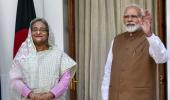Bangladesh Chief Adviser Muhammad Yunus has urged Beijing to extend its economic influence to Bangladesh, controversially mentioning that India's northeastern states being landlocked could prove to be an opportunity.

The remark, apparently made during Yunus' recent four-day visit to China, surfaced on social media.
Yunus, who met President Xi Jinping and signed nine agreements with Beijing during the trip, said, “The seven states of India, the eastern part of India, are called the seven sisters. They are a landlocked region of India. They have no way to reach out to the ocean.”
Calling Bangladesh as the “only guardian of the ocean” in the region, he said this could be a huge opportunity and could be an extension of the Chinese economy.
Sanjeev Sanyal, a member of Prime Minister Narendra Modi's economy advisory council, posted the video on X and questioned why Yunus mentioned India's northeastern region.
“Interesting that Yunus is making a public appeal to the Chinese on the basis that 7 states in India are land-locked. China is welcome to invest in Bangladesh, but what exactly is the significance of 7 Indian states being landlocked?” he said.
Yunus, while embarking on his return journey on Saturday, said in China that it is “important” for his country to see Beijing as a good friend.
“It's very important that we see China as our good friend,” Yunus said, projecting Beijing as a balancing factor against New Delhi. He expects bilateral relations to enter a new stage, Yunus told Chinese state-run Xinhua news agency in an interview.
Meanwhile, Assam Chief Minister Himanta Biswa Sarma described Yunus's remark as "offensive and strongly condemnable".
"The statement made by Md Younis of Bangladesh, the so-called interim Government referring to the seven sister states of Northeast India as landlocked and positioning Bangladesh as their guardian of ocean access, is offensive and strongly condemnable," Sarma posted on X.
"Such provocative statements by Md Younis must not be taken lightly, as they reflect deeper strategic considerations and longstanding agendas," he added.
Sarma pointed out that the remark underscores the "persistent vulnerability narrative associated with India's strategic 'Chicken's Neck' corridor".
"Historically, even internal elements within India have dangerously suggested severing this critical passageway to isolate the Northeast from the mainland physically. Therefore, it is imperative to develop more robust railway and road networks both underneath and around the Chicken's Neck corridor," he said.
Sarma also called for the prioritisation of exploring alternative road routes connecting the Northeast to the rest of India, effectively bypassing the 'Chicken's Neck'.
He said that this may pose significant engineering challenges, but it can be achieved with "determination and innovation".
After reaching China on March 26, Yunus spoke at Boao Forum for Asia annual conference in Hainan and on March 27 joined several events on the sidelines.
On Saturday, Yunus received an honorary doctorate degree from Peking University (PKU) and also delivered a lecture on the occasion, the state-run news agency BSS said.
China and Bangladesh on Friday signed nine agreements after Yunus' meeting with President Xi Jinping during which the Bangladesh chief adviser highlighted student protests that led to regime change in Dhaka and urged Beijing to play a “greater role” in establishing peace and stability.
Additionally, Bangladesh secured a commitment of USD 2.1 billion in investments, loans and grants from the Chinese government and its companies.
Bangladesh welcomed Chinese companies to participate in the Teesta River Comprehensive Management and Restoration Project (TRCMRP), according to a joint statement issued after the meeting between Yunus and Xi.











 © 2025
© 2025